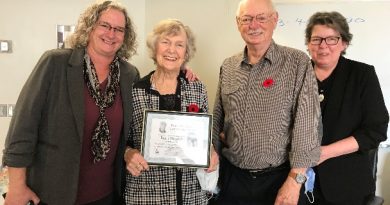April 22 COVID-19 update: Today’s numbers, For apologizes, Dr. Etches not sure Kanata a hot spot
Special to WC Online
OTTAWA – Ottawa Public Health (OPH) is reporting two new COVID-19 related deaths and 281 new cases today (April 22), as the number of local outbreaks continue to rise.
The health unit says there are three new outbreaks of the novel coronavirus at childcare centres in the city, bringing the total ongoing outbreaks to seven in such settings. Eight other outbreaks are being linked to schools, but with the stay-at-home order in effect, that number has been dropping.
OPH says the number of ongoing COVID-19 outbreaks in the community is up to 20. Many of those incidents stem from workplaces such as restaurants, offices and construction companies.
There are 17 outbreaks happening in Ottawa healthcare institutions, but that number hasn’t fluctuated much in recent weeks. Hospitals and group homes take up much of that list.
Two more COVID-19 deaths bring Ottawa’s pandemic toll to 486.
-19 hospitalizations in the city are up slightly today, to 120 from 118. The number of patients in local intensive care units is also up two to 29.
OPH says the weekly COVID-19 incidence rate, which it views as a key indicator of community spread, is down for a fifth straight day, to 178.3 per 100,000 residents. That’s still about four-and-a-half times higher than the province’s red-control tier threshold, but it’s better than the 222 per 100,000 the city hit on Saturday (April 17).
Residents being tested for the novel coronavirus are testing positive 11.7 per cent of the time.
OPH says it knows of 3,179 active cases of COVID-19 in the community.
There have been 22,686 confirmed cases of COVID-19 in Ottawa (19,021 resolved) since the start of the pandemic March 17, 2020 – 1,880 in the last week.
Ottawa has received 305,130 doses of vaccine to fight the virus to date and has administered 85 per cent of them.
Ontario is reporting 3,682 new cases of COVID-19 today, including 64 in the Eastern Ontario Health Unit’s area, 10 in the Leeds, Grenville & Lanark district and 12 in Renfrew County and district.
Chief medical officer unsure why province calls Kanata hotspot
KANATA – Ottawa medical officer of health Dr. Vera Etches says she is unsure how the Ontario government decided postal code K2V was one of the city’s COVID-19 hot spots.
Etches says she did not recommend the province include the Kanata-area postal code in its list of areas for vaccination priority.
The doctor believes the concept of high-priority areas for vaccination is valuable but cannot speak to how the province decided on the areas it thought should be the focus of vaccination programs.
Since early March, OPH has prioritized vaccinations in 21 high-risk neighbourhoods in the city but none fall within the K2V postal code.
Premier Doug Ford defended the designation recently.
“These hot spots were identified based on analysis conducted by the COVID-19 Science Advisory Table, which relied on Public Health Ontario data and confirmed by the non-partisan vaccine task force,” a recent statement from the premier’s office read. “Their analysis specifically looked at criteria including hospitalizations, outbreak data, low testing rates and deaths during the second wave of the pandemic.”
The statement included a chart of selected COVID-19 data, showing K2V had a 25 per cent higher COVID-19 death rate than the provincial average, a 44 per cent higher ICU admission rate, and 57 per cent higher hospitalization rate.
The chart compared K2V’s data to selected Toronto-area partial postal codes, most of them in Toronto’s northern suburbs. It did not include some of the worst hotspots, like Brampton, nor did it include data for the other two Ottawa partial postal codes named by the province.
Ford makes emotional apology
ONTARIO – Making his first appearance since a controversial announcement last Friday (April 17), Premier Doug Ford apologized to Ontarians.
The premier expressed regret for recent enforcement measures put into place by his government.
The new measures were followed by a wave of intense backlash with health experts contending the restrictions were not properly focused to successfully combat the third wave of the pandemic.
“I sincerely apologize,” Ford said in a media availability today (April 22).
The premier said his government responded too hastily with the new measures in the face of troubling modelling presented to provincial officials last week.
“We moved too fast, and I know some of those measures especially around enforcement went too far,” Ford said. “Simply put we got it wrong, we made a mistake.”
Asked if he still has the moral authority to lead Ontario, Ford says “I’m not one to walk away from anything.”
“We’re going to continue to lead and get through this pandemic,” he added. “When it comes to protecting our lives, our hospitals, and our people, we can’t waver.”
Ford also reiterated his government’s commitment to implementing a paid sick day program, following repeated calls for action on the issue.
Health Minister Christine Elliott signaled Tuesday (April 20) the province is ready to relent and announce a program with speculation it could arrive as early as this week.
Earlier this week, government house leader Paul Calandra says the province hopes to address “gaps” in a federal benefit including eligibility; reducing wait times for receiving funds; the amount of funding available; and time off to get vaccinated.
Public health experts, labour groups and local officials have been calling for sick-leave support for much of the pandemic, arguing it would reduce COVID-19 spread in workplaces.
Ford had not been seen since his announcement last week, self-isolating after a staff member he was in close contact with tested positive for COVID-19. Ford has since tested negative.
A statement from the premier’s office says the staff member was tested Tuesday (April 20) after learning of the risk of exposure.
Ontario reversed course on sweeping police powers instituted Saturday (April 17), just one day after Ford announced the measures that also triggered a swift and furious backlash.
Premier Ford himself took to Twitter over the weekend to announce the restrictions surrounding playgrounds would also be reversed.
The move to repeal the playground closures came after a number of municipal leaders, along with parents and medical professionals questioned the government’s decision.
As part of the Ford government’s new measures announced last Friday (April 16), non-essential travel into Ontario from Manitoba and Quebec was restricted and the province says individuals may be stopped by police who may ask questions as to their purpose for coming into the province.
CHEO improving on COVID-19 variant detection
OTTAWA – Researchers at CHEO are looking in to better ways of detecting COVID-19 variants in Ottawa’s waste water.
This comes as public health officials in Quebec confirm they have identified the provinces in Canada’s first case of the B.1.6.7 variant, which originated in India and is believed to be fuelling the current pandemic surge in that country. More than 300,000 cases were reported yesterday (April 21)
OPH officials said detecting and identifying COVID-19 in the wastewater is the city’s most important indicator for recognizing an oncoming trend.
It’s the reason researchers can be so precise because everyone contributes to the city’s wastewater.
According to Tyson Greber, an associate research scientist at CHEO, detecting new variants is not yet a perfect science. B.1.1.7, for example, which now dominates the COVID-19 detection types in the city’s wastewater at nearly 100 per cent, it only started appearing after there were more than 100 active cases in the city.
“It’s a question of how strong that signal is in the wastewater before we can confidently call it as one variant or another,” Graber said.
Greber said they do a wide range water test once a week that determines whether there are other types of variants in the city.
As with the UK variant, for example, Greber pointed out researchers were only able to start detecting the variant in the waste water when more than 100 cases were established in the city.










